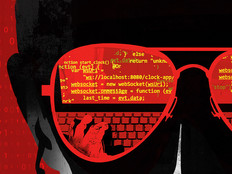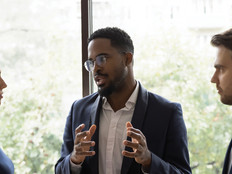Podcast to the People
What does the New York Police Department (NYPD) have in common with MTV, NASCAR and Bill O’Reilly? They’re all podcasting. The NYPD has joined the tens of thousands of media outlets, musicians, sports leagues, churches and everyday people who are recording audio content and broadcasting it over the Web.
Since launching its first audio podcast in October, NYPD’s three- to 10-minute episodes have featured experts on the police force — from terrorism analysts to the crime lab chief explaining how the department uses DNA evidence. One show alerted listeners to future street closures. Another taught subway riders to protect their valuables.
When the Coast Guard and NYPD rescue crews recently saved two helicopter pilots who crashed into the Hudson River, the NYPD posted a podcast the next day featuring interviews with the rescuers. The department’s weekly podcast has several thousand subscribers.
“It’s another way to reach citizens and get new information out,” says NYPD spokesman Jason Post, a former TV producer who conducts the interviews and produces the department’s podcasts. “It complements, but doesn’t replace, the other ways we reach the public — the traditional news media and our newsletter.”
A GROWING PHENOMENON
City and state governments are embracing the podcast phenomenon. Podcasting — a hybrid of the words “iPod” and “broadcasting” — has spread rapidly in the past two years. It’s an offshoot of the growth and popularity of MP3 music players, the Web and blogging.
The potential reach is enormous. Approximately 11 percent of all American adults, or 22 million people, own MP3 players. Of those, 6 million, or 27 percent, have downloaded podcasts from the Web, according to an April 2005 study by the Pew Research Center, headquartered in Washington, D.C.
Because podcasters use the standard MP3 file format to deliver their audio content, any MP3 music player or computer can play podcasts. A major benefit of podcasting is that it allows people to listen to the material anytime, whether they’re commuting or working out at the gym.
In Alexandria, Va., the city’s Office on Women produces podcasts on women’s health and safety issues, such as coping with breast cancer and protecting oneself from stalkers. Meanwhile, Warren, Mich., records podcasts on local city issues, while Arkansas, California and Michigan repurpose their governors’ weekly radio addresses and make them available on the Web as podcasts.
“It’s a tremendous hit,” says Joe Munem, communications director for the city of Warren. One recent podcast on gay rights in Warren received 4,000 downloads on the first day it was posted. Earlier this year, a gay couple was not allowed to apply for a family membership to the city’s recreation center. Munem interviewed one of the applicants and debated the issue with the head of a local gay rights activist group.
“The podcasts provide more in-depth discussion on issues for people who are actively seeking the information,” explains Munem, who also operates the city’s two cable TV stations, radio station and Web site. “Our city has a history of controversy, and if it’s going to be in the newspaper, then we don’t run away from it. We embrace it.”
CAPTURING AN AUDIENCE
Governments must make their podcasts informative and interesting enough to capture and keep an audience, says Craig Fifer, Alexandria’s e-government manager. Podcasts provide an opportunity for government agencies to communicate with residents they might not reach in other ways.
“The important thing to keep in mind is that as the government, we have to reach our audience where they are, and if they are downloading MP3s, then we need to be one of the MP3s they are downloading,” he points out.
In addition to a regular monthly talk show on women’s issues, this spring the city is planning a podcast aimed at teens to discuss issues such as health and relationships, says Jennifer Harris, community educational specialist for Alexandria’s Office on Women.
“I’m always open to embrace new formats to get our message out,” says Harris, who hosts the women’s show. “I love to expand beyond press releases and listservs, and I’m always looking to improve our outreach, particularly to teens and to victims.”
The city’s Office of Historic Alexandria has begun producing a podcast in which actors pose as George Washington and other notable figures. Another podcast features historical walking tours of the city, which officials hope will eventually include music from local performers. Alexandria will also produce a seven- to 10-minute local talk show on city projects and issues, Fifer adds.
However, not all podcasts need to be original. Just as state governments turn governors’ weekly radio addresses into podcasts, in the city of Warren, Munem makes his weekly radio news program and televised high school football highlights available as podcasts.
“Our editor can strip out the audio, digitize it and upload it for the podcast,” Munem explains. “If people missed the live cable show, they can come home, go to our Web site and hear how the 11 different high schools in our community did on the gridiron that night.”
GETTING STARTED
Podcasts are cheap and easy to produce. Government agencies need to make only a small technology investment to begin podcasting, Alexandria’s Fifer says. Some knowledge of technology and the Web is required, but the skills needed are not extensive.
“It’s really simple to do, and it’s virtually free,” he says. “A 12-year-old kid can produce a podcast with about the same audio quality as a huge megawatt radio station.”
In New York, the police department bought a Digital Audio Tape (DAT) recorder and audio editing software. Alexandria city officials purchased a digital audio recorder, microphones, a microphone stand and low-cost podcasting software that allows staff to edit and publish podcasts with ease.
“You can use an old-fashioned cassette tape recorder or a fancy new digital recorder — you just need to record audio,” Fifer says. “Depending on your level of proficiency, you can edit the audio and add music, but you just save it as an MP3 file and post it on the Web.”
With a digital audio recorder, city staffers can transfer the audio directly onto the computer with a USB cable. Similarly, with audio cassette tape recorders, all city staffers need to do is buy a special cable, where one end connects to the tape recorder’s headphone jack and the other end connects to the computer’s microphone jack. Computer software can then record the audio in digital format.
Post of the NYPD says it takes him a full workday to create a podcast, including conducting interviews, writing a script and then editing it. The editing part takes about 90 minutes, he says.
Afterward, Post gives the file to the police department’s Web designer to upload the show on the NYPD Web site and make the podcast available to subscribers through Really Simple Syndication (RSS) feeds, an XML format that makes it easy to syndicate content to other Web sites, such as podcasting directories. RSS feeds also allow listeners to subscribe to podcasts, so they can automatically download new episodes when they become available.
Alexandria’s Fifer says the podcasting software he bought is so easy to use that people with no Web skills can simply click a few buttons to upload their podcasts to the Web and to RSS feeds.
In Warren, Mich., the city’s communications department uses advanced audio recording equipment owned by its cable TV and radio stations. The city converted an old storage closet into a podcasting studio by putting acoustic foam on the walls and adding a table, three microphones and a mixer that allows staff to adjust sound levels during recording, Munem says. The city also installed a telephone-computer interface that allows the communication department’s staff to interview city leaders over the phone and record the interview digitally.
When staff members edit the podcasts, they use compression software to make the audio files smaller. This allows faster downloading, and the files take up less hard drive space or memory on MP3 players, Munem notes. He says that a typical podcast is 30 minutes long and takes up 5 megabytes of space on the city’s servers.
“Some documents on our Web site, such as budgets or detailed development plans, are larger than most podcasts,” Alexandria’s Fifer adds.
To increase the number of listeners, government agencies should promote their podcasts in their newsletters, community cable TV news programs and radio stations, says Lori Irla, who anchors Warren’s weekly TV newscast and also podcasts. For example, she says, the TV newscast may play a short clip of a certain news item, followed by her announcement that the city has devoted a longer podcast to the topic.
City officials say podcasts are an effective tool for communicating with residents, and they urge local and state government agencies to consider creating their own.
“Give it a try,” Alexandria’s Fifer suggests. “It’s easy, virtually free and something people want. They are getting podcasts from nongovernment sources, so it makes sense for us to be in the mix as well.”
PODCASTING BY THE NUMBERS
• 22 million American adults own MP3 players.
• Of that number, 6 million have downloaded podcasts.
•An equal number of men and women listen to podcasts.
• Nearly half of people between the ages of 18 and 28 who own MP3 players have downloaded podcasts, compared with about 20 percent of people 29 or older.
BASED ON A SURVEY OF 2,201 PEOPLE, INCLUDING 208 OWNERS OF MP3 PLAYERS.
SOURCE: PEW RESEARCH CENTER, APRIL 2005 REPORT.
Tips on Podcasting
Here are some guidelines for state and local government agencies that want to start podcasts:
Start small. You don’t have to invest in high-tech audio equipment. A digital audio recorder that allows you to transfer audio to your computer and save it in the MP3 format, along with an inexpensive microphone, should suffice.
Listen to other podcasts, including ones that are not produced by government agencies, to get a feel for their pace, structure and tone.
Podcasts should inform your listeners, but to attract more subscribers, you have to make the shows interesting. Experiment and try new ideas.
Write the script in advance and speak naturally into the microphone. If you are going with a talk-show format, calm guests who might not be used to public speaking. Give them easy warm-up questions and remind them to breathe slowly.
Promote your podcasts through your other outlets, such as press releases, Web sites and community TV or radio programs.
Use royalty-free music or ask local musicians if you can use their work. If you use commercial music without prior approval, you may be infringing on copyrights.







